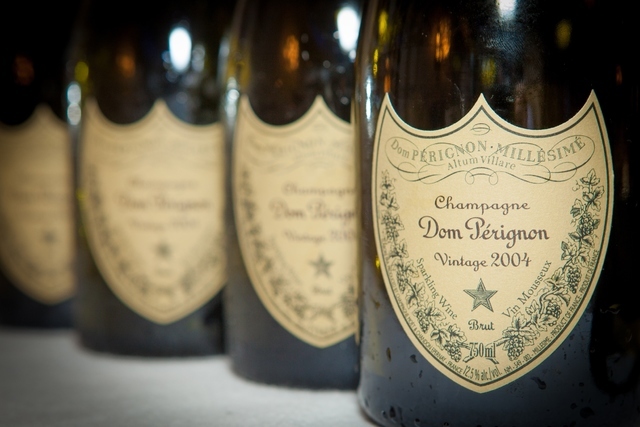‘Your Brain on Fine Wine’: Can champagne forestall Alzheimer’s?


Several years ago while visiting the Dom Perignon cellars in Epernay outside Paris, I was told a story that backs up the folklore that “an apple a day keeps the doctor away.” The ill winemaker was confined to bed and given days to live by his doctor. His champagne colleagues, grape harvesters and corporate execs loved this man so much that they ordered the best reserve bubbly from the cellars be brought to his bedside for an appropriate send off to where the monks really do drink the stars.
Returning the next day, the doctor was horrified to discover his patient “feeling no pain” and inebriated. The medicine man protested, “You’ll kill him.” But his friends said that if he was going to die anyway, he should pass over in style. Honest and true, he went on to live another 10 years and returned to work providing us with the world’s best champagnes.
In recent weeks, bold claims about the medical benefits of wine and champagne have made headlines, with some Alzheimer’s doctors saying that champagne in moderation can forestall the onset of dementia. I’ve been drinking the stuff for so long now, I should be good for many more years to come.
But the subject of champagne, wine and good health got me wondering if everybody should indulge. So I turned to Dr. Sarah Banks, head of the neuropsychology program at our Cleveland Clinic Lou Ruvo Center for Brain Health, for an official verdict, and she said that a study of the brain on fine wine does show differences in sommelier’s brains.
She should know, while Las Vegas has more great sommeliers in our fine restaurants than even Los Angeles or New York. Dr. Sarah recently conducted that study titled “Your Brain on Fine Wine,” which examined the brains of master somms compared to regular people.
The study showed that the part of the brain that somms use for memory and smell, which is affected by Alzheimer’s disease, was actually bigger than the average person. Thus the study cast light on how our brains can continue to change and be shaped well into adulthood and how passion, curiosity and hard work intersect to change the way our brains work. Here is more from Sarah:
Everybody loves wine, including me. One evening, over a fine dinner, I was chatting with the sommelier about his training and was amazed by the amount of work, dedication and passion that is required to achieve Master Sommelier status. I began to wonder if their expertise and heightened sense of smell was reflected in changes to their brain structure and function, and, thus, the “Your Brain on Fine Wine” study at the Cleveland Clinic Lou Ruvo Center for Brain Health was born.
Elite level of wine certification
First, it is important to understand what it takes to become a Master Sommelier, the most elite and difficult level of wine certification one can achieve. If you consider yourself a wine lover, think again. The truth is Master Sommeliers have worked for years honing their skills and perfecting their senses to earn their title as wine experts.
In order to become a Master Sommelier, one has to be certified by the Court of Master Sommeliers and pass a total of four examinations. The final exam is a blind tasting, where candidates sample six glasses of wine and must then be able to identify the wine’s region, grape varietal and the year it was made. Some refer to it as the world’s hardest test: Only 230 people can claim this master status.
Of the 230 Master Sommeliers worldwide, 14 of them are here. In fact, Las Vegas holds the distinction of having more Master Sommeliers than any other U.S. city, making it the perfect place to conduct the brain and fine wine study.
Previous studies have shown that experts in a particular field have structural differences in the part of the brain associated with their skill set. Master Sommeliers, for example, highly rely on their sense of smell to identify and analyze wine. The goal of our study was to compare the brains of Master Sommeliers and non-experts (people with no real wine expertise despite what they may have thought).
To do this, we compared the brains of 13 sommeliers to 13 non-experts for differences in brain shape and activity while they smelled wine and other substances. Using a series of tests, we examined the subject’s smell and visual judgments.
Additionally, the subjects participated in exams that tested their wine-related experience and knowledge such as identifying wine using their sense of smell and the demographics of wine. Further data was collected by performing MRI tests, which examined the structural and functional connectivity in the brain, while the Master Sommeliers and non-experts tried to identify smells.
The results of the study indicated that the parts of the brain used for memory and smell, which are commonly affected by Alzheimer’s, were bigger in Master Sommeliers. Also, the sommeliers with the most experience had the highest volume in this region. This suggests that the human brain may continue to evolve well into adulthood based on our life experiences and hobbies.
We also found that there were differences in how regions of the brain function in response to smells. The sommelier’s brains showed much more activity when making decisions about smells than pictures, suggesting that the differences are really specific to the skill in which they are experts.
The Master Sommeliers in the study were all very passionate about their jobs and continue to work every day to hone and develop their skills. We can all learn from this to improve our brain health. Our brains continue to change and grow as we learn more and do more. So try a new hobby, develop a passion, and stay active to improve your overall brain health.
Cheers!












